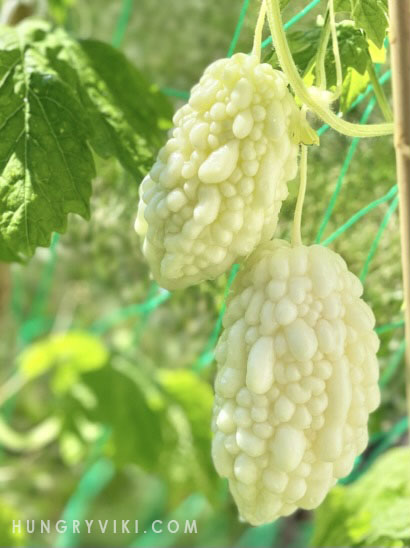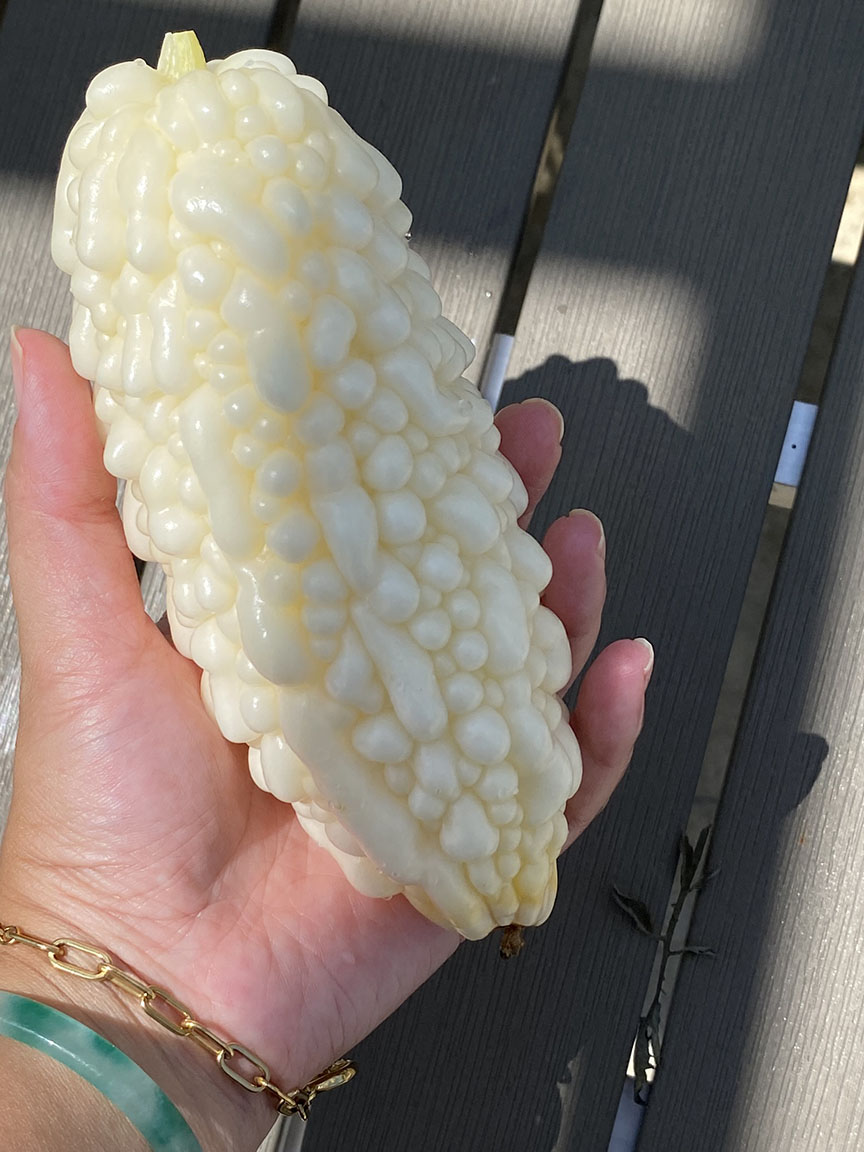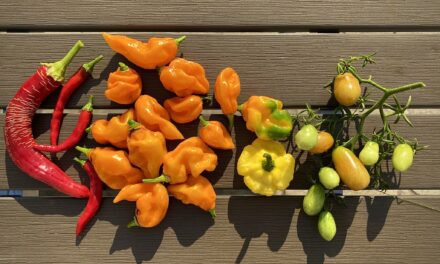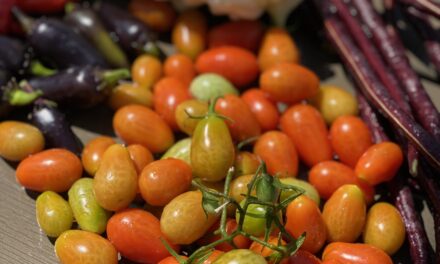Bitter Melon
Growing Your Own Bitter Melon
Growing bitter melon (Momordica charantia) from seed can be a rewarding endeavor, yielding a unique and nutritious vegetable. Here’s a general guide on how to do so:
-
Seed Selection: Start with high-quality seeds from a reputable source. Bitter melon seeds can be found in gardening stores or online.
-
Germination:
- Soak the seeds in warm water for about 24 hours before planting. This can help improve germination rates.
- Fill small seedling pots with a well-draining potting mix.
- Plant the soaked seeds about half an inch deep in the soil.
- Place the pots in a warm, bright location, such as a sunny windowsill.
-
Temperature and Light:
- Bitter melon plants thrive in warm climates. Ensure temperatures stay consistently above 70°F (21°C).
- Provide ample sunlight or use a grow light if growing indoors.
-
Transplanting:
- Once the seedlings have developed a few true leaves and the danger of frost has passed, transplant them into larger containers or directly into the garden.
- Choose a location with full sun and well-draining soil.
-
Spacing:
- Space bitter melon plants about 12 to 18 inches apart in the garden to allow for proper growth and air circulation
Support:
-
- Bitter melon is a vining plant that benefits from support. You can provide a trellis, fence, or other vertical structure for the vines to climb.
-
Watering and Fertilizing:
- Keep the soil consistently moist but not waterlogged. Bitter melon prefers slightly moist conditions.
- Fertilize the plants with a balanced, all-purpose fertilizer every few weeks during the growing season.
-
Pollination:
- Bitter melon plants have separate male and female flowers. Bees and other pollinators are essential for fruit production. You may need to hand-pollinate if pollinators are scarce.
-
Pruning:
- Regularly prune the plant to encourage better air circulation, control its growth, and maintain its shape.
-
Harvesting:
- Bitter melon fruits are typically harvested while they are still green and before they become too mature and bitter. The exact timing varies, but it’s usually around 10 to 12 weeks after planting.
- Culinary Use:
- Bitter melon can be cooked in various ways, such as stir-frying, sautéing, or stuffing. It’s often used in Asian cuisines.
Growing bitter melon from seed requires attention, patience, and care, but the process can be incredibly rewarding as you watch the plant develop and eventually enjoy the unique fruits it produces.

Benefits
Bitter melon (Momordica charantia) is not only a unique and flavorful vegetable but also boasts an array of nutritional benefits that contribute to overall health and well-being. Rich in vitamins, minerals, and bioactive compounds, bitter melon has been valued in traditional medicine and culinary practices for its potential health-promoting properties.
Nutritional Profile: Bitter melon is low in calories and carbohydrates, making it a suitable option for those aiming to manage their weight or control blood sugar levels. It is a good source of dietary fiber, which supports digestive health and helps maintain a feeling of fullness.
Vitamins and Minerals: Bitter melon is rich in vitamins and minerals that play essential roles in various bodily functions. It contains a notable amount of vitamin C, an antioxidant that supports the immune system and skin health. Additionally, it provides vitamin A, which is important for vision, and several B vitamins, which are involved in energy metabolism.
Phytonutrients and Health Benefits: One of the standout features of bitter melon is its abundance of phytonutrients, including flavonoids, polyphenols, and alkaloids, which contribute to its distinct bitter taste. These compounds are believed to offer a range of potential health benefits:
- Blood Sugar Regulation: Bitter melon has gained attention for its potential to help manage blood sugar levels. Some compounds in bitter melon may mimic the action of insulin, facilitating glucose uptake by cells and reducing blood sugar spikes after meals. This makes it of interest to individuals with diabetes or those at risk of developing the condition.
- Antioxidant and Anti-Inflammatory Properties: The antioxidants found in bitter melon, such as vitamin C and flavonoids, help combat oxidative stress and inflammation in the body. These properties contribute to overall cellular health and may reduce the risk of chronic diseases.
- Gut Health: The dietary fiber in bitter melon supports a healthy digestive system by promoting regular bowel movements and aiding in the maintenance of gut flora.
- Weight Management: Bitter melon’s low-calorie and low-carbohydrate content, combined with its fiber content, can contribute to weight management efforts by promoting satiety and helping control appetite.
- Potential Cancer-Fighting Properties: Some studies suggest that bitter melon extracts may have anticancer effects, possibly due to their ability to inhibit the growth of certain cancer cells and induce apoptosis (programmed cell death).



